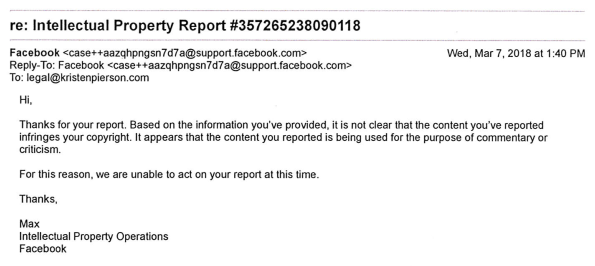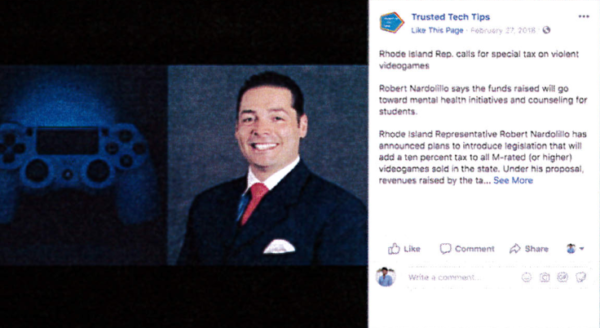[Most Recent Entries] [Calendar View]
Friday, January 18th, 2019
| Time | Event |
| 3:05a | Singapore Prepares Ban on Piracy-Configured Media Devices & Software  In common with dozens of countries around the world, Singapore is struggling to contain the spread of piracy-configured set-top boxes. Branded by industry as ‘ISDs’ (Illicit Streaming Devices), these products enable consumers to access a wide range of content – usually movies and TV shows – over the Internet without paying an associated fee. The disruption caused by such devices, which often contain Kodi add-ons and software applications such as Showbox and Mobdro, is regularly criticized by industry players who feel that copyright legislation isn’t always in step with advances in technology. In Singapore, such devices currently sit in a legal gray area but that position is set to change later this year with a range of proposed amendments to copyright law published Thursday by the government. The product of a three-year review by the Ministry of Law and the Intellectual Property Office, the Copyright Review Report details measures to criminalize and impose civil penalties on those who make, import, or commercially distribute piracy-configured media devices. While current law is capable of dealing with infringing items such as pirate DVDs, so-called ISDs contain no infringing movies or TV shows at the point of sale. The proposed amendments close this loophole, and then some. “Our policy position is not to allow commercial gains derived from enabling access to content from unauthorized sources,” the review paper reads. “A DVD may hold unauthorized content, while a set-top box which streams content may not hold the actual unauthorized content itself. However, we do not view this as a material difference. While the proposals aim to prevent manufacturers, importers, distributors and retailers from knowingly selling devices already set up to access infringing sources, they also claim to close a potential loophole. In some cases, perhaps understanding the thin line between legal and illegal supply, some sellers of media boxes have supplied them without any piracy-enabling software installed “[T]o incur liability, the retailer should have some degree of knowledge that the device in question can, and very likely will, be used to access content from a source that is not authorized by the rights-holder,” the proposals read. This will cover people who sell boxes ready-configured, those who advertise their products for infringing purposes, and those who provide assistance to buyers in order to enable their devices for piracy. So far, the proposals deal with device sellers but there are also those who do not sell devices but instead specialize in setting them up for piracy purposes. The proposals are also set to target people who, for a fee, add infringing capabilities to media devices by installing or providing software, such as Kodi add-ons and similar tools.  Speaking with TorrentFreak, Neil Gane of the Asia Video Industry Association’s Coalition Against Piracy (CAP) says that the ISD problem is the most important copyright infringement issue in Singapore but dealing with it under current law is not straightforward. “We are glad the government has recognized that this lack of legal clarity had allowed ISD retailers to mislead consumers that the content accessible through such TV boxes was legal and that requisite subscription charges went to rights-holders – which they did not,” Gane says. “As such, we welcome the proposals to modify Singapore’s Copyright Act to better deal with this form of infringement. We are encouraged by the language in the Copyright Review Report which implies a concerted effort to clarify and ‘future proof’ the current copyright legislation.” The full report can be viewed here (pdf) Source: TF, for the latest info on copyright, file-sharing, torrent sites and more. We also have VPN reviews, discounts, offers and coupons. |
| 9:44a | Austrian Telecoms Regulator Rejects “Informal” Pirate Site Blocks  Since the turn of the decade, Austria has been grappling with the controversial issue of pirate site blocking. While rights holders have long-insisted that blocking is an appropriate and proportionate response to large-scale infringement, local Internet service providers have remained unconvinced, despite many legal processes. Last November, the Supreme Court finally ruled that The Pirate Bay and other “structurally-infringing” sites including 1337x.to can indeed be The Telecom Single Market (TSM) Regulation established the principle of non-discriminatory traffic management in the EU. It does allow for the blocking of copyright-infringing websites but only when supported by a clear administrative or judicial decision. However, rights holders have also written to ISPs in Austria demanding that they block sites that are potentially related to a blocked platform (such as a mirror or proxy) but aren’t specifically detailed in an official order. Last January, this problem finally came to head when, after ‘voluntarily’ blocking several Pirate Bay clones, ISP T-Mobile reported itself to the Austrian Regulatory Authority for Broadcasting and Telecommunications (RTR) for a potential net neutrality breach. As reported by Tarnkappe, other providers including A1, Drei, Kabelplus, Liwest, and UPC later followed suit. “The decision of the providers to self-disclose may seem surprising at first glance,” says Maximilian Schubert, Secretary General of Internet Service Providers Austria (ISPA). “However, this self-disclosure will hopefully open the eyes of many people entrusted with the topic of how unclear and almost worrying the situation is in this country.” At issue is whether local ISPs are obliged to block ‘pirate’ sites following an informal request from rights holders and in the absence of an official order. It now transpires, thanks to pressure from the ISPs, that they do not have to block following such requests. Telecoms regulator Telecom Control Commission will now get involved when a block is requested which will lead to a supervisory process and a full review by the agency. Informal blocking of domains following a simple request from rights holders is therefore ruled out. “From ISPA’s point of view, this has sent another clear signal that network blocking constitutes a serious infringement of fundamental rights,” Schubert says. “To rely on an informal system of ‘bartering’ in such a sensitive matter, as the rights holders have requested, is simply incompatible with the principles of a modern constitutional state. It is now up to the legislator, while respecting the fundamental rights concerned, to find a solution that takes account of the different interests.” Moving forward, ISPA says that ISPs want an “independent judicial body” to confirm in advance the legality of any blocking while ensuring that a minimum of time and resources are expended on the blocking process “In addition, users need to be able to clearly understand why they are being blocked and thus have the opportunity to fight the block directly at the crucial point. Furthermore, the providers must be compensated for their costs and protected against any claims of third parties,” ISPA concludes. Source: TF, for the latest info on copyright, file-sharing, torrent sites and more. We also have VPN reviews, discounts, offers and coupons. |
| 7:15p | Facebook Sued For Refusing to Remove Copyrighted Photo
Many photographers don’t have the time or resources to go after these types of infringements, but some are clearly drawing a line in the sand. This week, photographer Kristen Pierson filed a complaint against Facebook at a New York District Court. Pierson accuses the social media platform of hosting and displaying one of her works without permission. Normally these issues are resolved with a DMCA takedown notice but in this case that didn’t work. Last year, Pierson noticed that the Facebook account “Trusted Tech Tips” had used one of her works, a photo of Rhode Island politician Robert Nardolillo, without permission. When she requested Facebook to remove it, the company chose to leave it up instead. “Hi-, Thanks for your report. Based on the information you’ve provided, it is not clear that the content you’ve reported infringes your copyright,” the Facebook representative wrote in reply. “It appears that the content you reported is being used for the purposes of commentary or criticism. For this reason, we are unable to act on your report at this time.”  According to the Rhode Island-based photographer, Facebook failed to comply with the takedown request and can’t rely on its safe harbor protection. “Facebook did not comply with the DMCA procedure on taking the Photograph down. As a result, Facebook is not protected under the DMCA safe harbor as it failed to take down the Photograph from the Website,” the complaint reads.  “Facebook infringed Plaintiff’s copyright in the Photograph by reproducing and publicly displaying the Photograph on the Website. Facebook is not, and has never been, licensed or otherwise authorized to reproduce, publically display, distribute and/or use the Photograph,” it reads. The photographer is not new to these types of lawsuits. She has filed similar cases against other outlets such as Twitter. The latter case was eventually dismissed, likely after both parties reached an agreement. In the present case, Pierson requests a trial by jury but it wouldn’t be a surprise if this matter is settled behind closed doors, away from the public eye. — A copy of the complaint against Facebook is available here (pdf). Source: TF, for the latest info on copyright, file-sharing, torrent sites and more. We also have VPN reviews, discounts, offers and coupons. |
| << Previous Day |
2019/01/18 [Calendar] |
Next Day >> |
 Every day millions of people post photos online, without approval from the rightsholder. This is particularly prevalent on social media platforms such as Facebook.
Every day millions of people post photos online, without approval from the rightsholder. This is particularly prevalent on social media platforms such as Facebook.